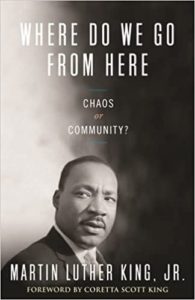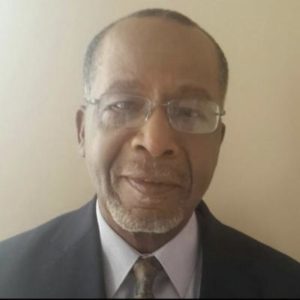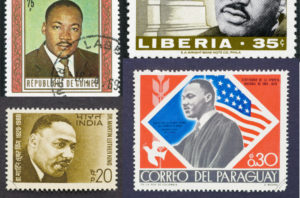|
Getting your Trinity Audio player ready...
|
Reading Time 7 mins
January 17, 2022
“I refuse to accept the cynical notion that nation after nation must spiral down a militaristic stairway into the hell of thermonuclear destruction. I believe that unarmed truth and unconditional love will have the final word in reality. This is why right temporarily defeated is stronger than evil triumphant.” Dr. Martin Luther King, Jr., The Nobel Peace Prize Acceptance Speech, 1964.
“They shot him!” On April 4, 1968, unruly crowds interrupted our Friday evening Black Power debate with a chaotic announcement of Dr. King’s assassination. It was as if the earth had stopped rotating. We were dumbfounded. Memorial Park in Port of Spain, Trinidad, murmured with a hum of disbelief. No, I thought, as I felt my heart sink to my sole. It was another of life’s contingencies. Not unexpected, but still shocking. South along Frederick Street, traffic came to a virtual halt. How could this be? Then the mournful wail of cacophonic horns joined the setting sun, sinking slowly to a depth of utter bewilderment. History was alive; it engulfed us.
assassination. It was as if the earth had stopped rotating. We were dumbfounded. Memorial Park in Port of Spain, Trinidad, murmured with a hum of disbelief. No, I thought, as I felt my heart sink to my sole. It was another of life’s contingencies. Not unexpected, but still shocking. South along Frederick Street, traffic came to a virtual halt. How could this be? Then the mournful wail of cacophonic horns joined the setting sun, sinking slowly to a depth of utter bewilderment. History was alive; it engulfed us.
To this day, 53 years later, I still hear his sonorous, unmistakable voice in tune with the Northeast trade winds sweeping through the Northern Range in memory of his exhortation, “We have come here because we share a common concern for the moral health of our nation.” Dr. King’s assassination was almost a mortal blow to my commitment to Love and human solidarity. I remained sick for weeks, drowning and grieving in deep sorrow at this unbelievable loss.
Within days of his assassination, Cousin George Brizan telephoned me from Grenada, as did Horace Granderson, my Rastafarian friend from Kingston. “What the hell is going on?” George asked. They were both profoundly shocked and wondered how the Black Power Movement in Trinidad would respond. Following Che Guevara’s assassination in Bolivia in 1967, 1968 was already a tumultuous year with international wildfires of leftist pushback. From continents to island nations, the growing discontent simmered. Discord was ubiquitous. Economic disparity, racial injustice, and deep poverty scarred the landscape.
In France, unions called a national strike action while Warsaw Pact tanks rumbled into Czechoslovakia further east to suppress protests that would challenge USSR hegemony. Italy was wrestling with industrial discontent, while in the United States, the Civil Rights Movement became wedged without stability between Martin Luther King’s commitment to nonviolent protest and Malcolm X’s “…By Any Means Necessary” advocacy. Throw in the Black Panthers, and extreme displeasure was brimming and bringing cities to their knees. Some protesters wanted the dens of oppression to “Burn baby burn,” while others, driven by King’s nonviolent call, wanted to “Build baby build.”
It was a time of profound unrest. Conflict was everywhere!
Dr. King Jr. helped me transform my relationship with our world….his declaration of Love, Truth, and the Courage to do what’s right should be our guideposts on this lifelong journey.
1968 was a watershed year for small Caribbean islands, as well. In Jamaica, the much-despised Rastafarians were agitating as the neo-colonial government of Hugh Shearer pursued reactionary steps to curtail the spread of revolutionary action. Walter Rodney, one of the Caribbean Region’s respected intellectuals, was banned from returning to lecturing assignments at the University of the West Indies at Mona Campus in Jamaica.
One week before King’s assassination, some of my more thoughtful Sandhurst buddies (Raffique Shah, Rex Lassalle) and I were recounting the innumerable times Dr. King was illegally put in jail, almost fatally stabbed, and deliberately harassed. We were searching our consciences to determine whether we would bring our military training to defend the tyranny of the minority, the injustice of the times in Trinidad and Tobago. The idiom of unjust laws entered the lexicon. Should we obey unjust laws, laws not rooted in cosmic ecological oneness or simple fairness? Statutes were promulgated by a recalcitrant political class in an ‘independent’ Trinidad and Tobago just as they were in the Southern USA-then and today!
We had been aware of the depth of hatred Southern Whites held for Black Americans. Indeed, Black American resistance fueled much of our protests in support of the Afro/Indo majority in Trinidad and Tobago, who were victims of economic dislocation and Caribbean colorism. Derek Walcott’s red “niggers” in St Lucia and Jamaica’s ‘browning‘ highlighted our predicament. Shades of black gave rise to all manner of put-downs and hateful vitriol. We, too, felt the economic pressure of denial, deprivation, dehumanization, and racial discrimination. Nevertheless, Calypsonian the Mighty Duke encouraged us to be okay with the color of our skin and declared in song, “Black Is Beautiful.” We realized for the first time that a chief instrument of cultural change was a talent for speaking differently.
In the Southern USA, Montgomery, Alabama, and Memphis, Tennessee, particularly, were dens of deep despise and resentment of “negro” presence. It was Black or White, with no shades of grey allowed. Painfully, Dr. King’s assassination turned out to be an opportunity to transform my relationship with the unseen contingencies of the cosmos. I sought now to live peacefully and lovingly with the willingness to take on ahead of time, without knowing what would happen, the responsibility to see that whatever happens turns out to be the opportunity of a lifetime. Dr. King helped me transform my relationship with our world.
Dr. King sought to promote Love as a regulating ideal, to inject new meaning into civil disobedience as a nonviolent tool of effective protest. He believed that “Love is the greatest force in the universe. It is the heartbeat of the moral cosmos.” Calypsonian, the Mighty Sparrow, relished King’s passion and poetry. Moreover, he believed King’s leadership abilities made him good material for the American presidency. Sparrow’s “Martin Luther King for President” filled the airwaves. And, The Mighty Stalin immortalized the line “We shall overcome someday,” and it resonated throughout the Caribbean, from Trinidad’s Memorial Park to Parade Square in Jamaica, Grenada’s Market Square, and beyond.
History is replete with famous leaders whose beliefs in some worthy ideal inspired remarkable accomplishments. Dr. Martin Luther King Jr. led the Civil Rights Movement, believing fervently that everyone would have the same freedoms in the United States one day. Driven by Gandhi’s method of Love through nonviolence, he grasped the power of nonviolence and fashioned that approach as the guiding principle of the Civil Rights Movement. That belief drove him to fight for change without the violence other groups advocated. He set forth his philosophy and dictated his actions with incomparable eloquence and nonviolence. Dr. King Jr. symbolized the strength and spirit of the Civil Rights Movement. The MLK Holiday is an honor accorded because of his leadership of the African American struggle for social justice and freedom and its impact on the American psyche. He asserted: “We must learn to live together as brothers, or we will perish together as fools.” It was a struggle that still resonates throughout the world.
Though he won the Nobel Peace Prize he should also have won the Nobel Prize for Literature, if only for the pure poetry of his oratory. He was a serious advocate for world peace. The Mighty Bomber later sang a seriously sweet calypso: “Peace in the World,” with poignant words which reverberate even more powerfully today, “All we want is peace in the world, peace in the world, peace in the world/ Conflict will never cease until there’s peace.” Lyrics that could have replaced “We Shall Overcome Someday” as the guiding hymn of the movement. Dr. King believed that peace contributes to the stillness of the soul and well-being. All the great ancient and contemporary gurus know this. Hence the exhortation of Christ to love your enemies, bless them that curse you, do good to them that hate you, and pray for those who despitefully use you and persecute you. Like Dr. King, Bomber believed that each of us has the power to generate peace through our exhortation and our declaration of constructive living. We can undertake to see that any circumstance is an opportunity for peace because our word willed it into being.
Whether Dr. King was a mystic is unsettled, of course, but his final speech on April 3, 1968, before being assassinated the following day, gives some hints. Dr. King was a profoundly spiritual man, a Baptist preacher of magnificent metaphors who used incomparable rhetoric to persuade a people tired of being kicked about by the brutal feet of oppression. From the Sermon on the Mount, he came to understand the love ethic and used his soaring rhetoric to promote dignity and Love among all. With an outpouring of pure poetry, his “Letter From Birmingham Jail,” as one example, articulated a crystallization of his theory of nonviolence. “We must not allow ourselves to become like our oppressors!” In his final speech on April 3, 1968, he proclaimed:
“We’ve got to stay together. We’ve got to maintain unity. I’ve been to the mountaintop, and I’ve seen the promised land. We as a people will get to the promised land. I want you to know that after tonight I’m not worried about anything.”
It was as if he knew something that God had told him. Only mystics talk like that. Dr. King Jr. was convinced that the nation must undergo a radical shift in fairness and justice, a true revolution of values. King’s words resonate even more today as the enemies of democracy and social progress use every trick to denigrate legacy and tradition by denying too many citizens their right to vote.
He had a dream indeed to change life’s blueprint. But a stalwart of Black hatred had a different plan. Dr. King’s declaration of Love, Truth, and the Courage to do what’s right should be our guideposts on this lifelong journey, but sometimes these values get in the way of what lesser envious mortals have in mind.
They assassinated the King. Long Live the King!
*This is an extended version of an article first published in Everybody’s January 2022.
 Dr. David Brizan is a Leadership and Life Empowerment Coach working at the intersection of creativity and pragmatic action. He is a graduate of the Royal Military Academy, Sandhurst, and the inventor of the VICAR model of constructive living and C2nd Linguistic Strategies. His work delivers unconditional personal power (UPP) with models, tools, and empowerment techniques through Responsible and Rugged Individualism (2RI). He delivers transformational coaching, training, and workshops throughout the Caribbean and North America.
Dr. David Brizan is a Leadership and Life Empowerment Coach working at the intersection of creativity and pragmatic action. He is a graduate of the Royal Military Academy, Sandhurst, and the inventor of the VICAR model of constructive living and C2nd Linguistic Strategies. His work delivers unconditional personal power (UPP) with models, tools, and empowerment techniques through Responsible and Rugged Individualism (2RI). He delivers transformational coaching, training, and workshops throughout the Caribbean and North America.


I really like this analysis of the life and times of the great Sidney Poitier. One of the things a lot of people don’t know is how much Sidney contributed to black causes like the NAACP and other black empowerment groups. Sidney also went out of his way to help upcoming black actor and actresses (at a time when Caucasian men ran everything in Hollywood). This article gave a very comprehensive perspective of Sidney. I too felt a certain way when I think about his more conservative roles such as Guess Who is Coming to Dinner. But these were the times. I think Sidney’s overall contributions speak for itself. As Ms Anderson says in the post script, some of the more affirming black presentations were stymied by the conservative, even racist, expectations of the prevailing moments in question. But Sidney has to be credited for pushing the margins.